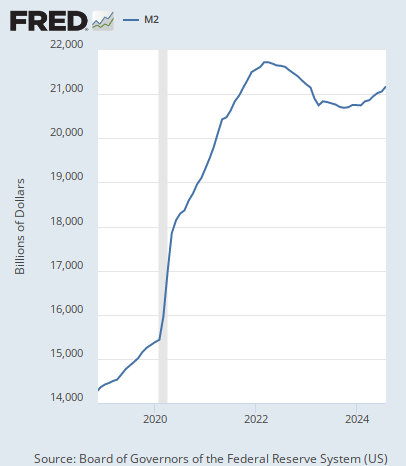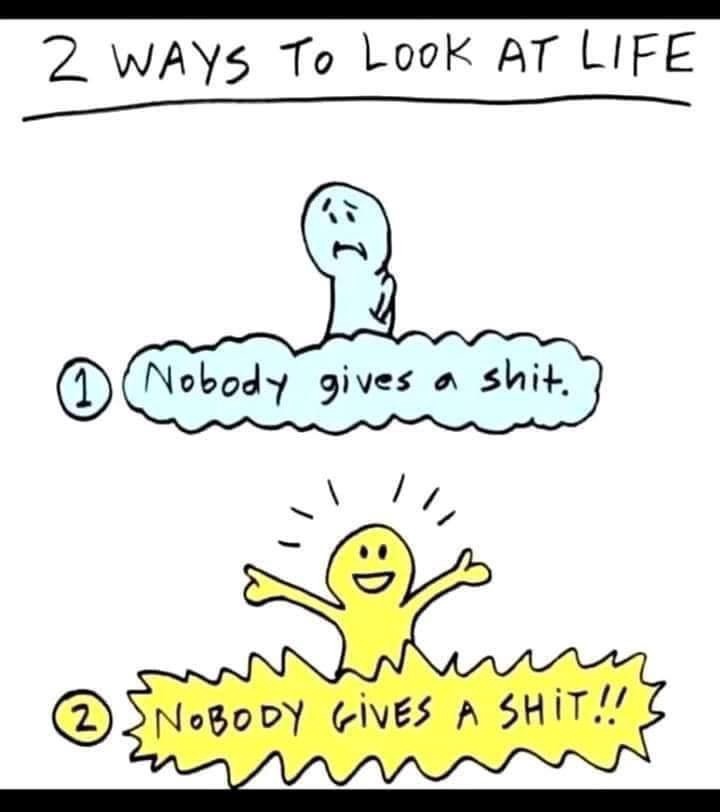actually, the inflation that’s happening is because the US government keeps printing money just to dump into the stock market every couple of months
At the beginning of the pandemic when the stock market did a 90 degree drop, the government passed that one bill that printed $2,000,000,000,000 per day and dumped it into the stock market to keep it afloat.
That’s where the inflation is coming from. Not millennials and Gen-Z getting living wages.
I’m sorry, but the whole “inflation is a monetary phenomenon caused by excess money in the economy” neoliberal trope has been scientifically debunked so many times, that it’s inexcusable that people throw it around.
Look at any serious study of the 2022 inflation and they all point to the same: rise in energy prices, bottlenecks in the supply chain, and companies artificially increasing prices above the increase in their operational costs to increase profit.
If you’re still not convinced, please explain me how the fed creating dollars led to inflation in the Eurozone, or why if it’s a monetary phenomenon, prices didn’t increase homogenously in European countries that share the same currency.
To people who don’t watch the stock market: this didn’t happen. The “government” can’t physically print that much money per day. And even if it could, stock exchanges don’t accept cash.
The money supply increased about $3.5 trillion in 2020, as you can see in this chart. Nowhere near $2 trillion per day.

Also, the US Treasury and the Federal Reserve (separate organizations) don’t buy stocks. They buy Treasury Bonds or sometimes mortgage backed bonds, although that last happened during the 2008-9 recession.
After reducing the federal funds target close to zero during the financial crisis, the FOMC turned to another type of policy to provide liquidity to the financial system and to encourage recovery: the purchase of large amounts of longer-term U.S. Treasury securities and mortgage-backed securities, also through open market operations.
Yes. Corporate greed is a real thing. Consumer choice is a real thing. The relationship between supply, demand, and pricing is a real thing.
The market is a real thing! Glad we’re on that same page about that.
Sure! You just interprate it differently.
Unregulated capitalism will be the death of us all.
Capitalism will be the death of us all.
I’ll take it one step further: currency was a bad idea that turned resource allocation into a number-go-up game.

Disagree. Currency allowed the flourishing of civilization. You can’t effectively trade between cultures or at long distances on the barter system.
What we’ve done with currency since then, yeah, maybe we’re on the same side there. But currency, created as an abstract for value, was a great invention. Civilization as we know it would not have been possible without it.
Though, now that I mention that… maybe civilization “as we know it” isn’t so hot after all.
Don’t you love when you end up talking yourself out of your own argument?
Only once there’s no longer a profit in keeping us alive.
So we’ve got a couple good years left in us!
The death of us all will be the death of us all.
The death of death will be the death of death.
The of will be the of
I mean isn‘t what‘s described here also just basic supply/demand?
Unfortunately, the demand for things like food doesn’t go down just because you don’t have money
Fortunately there’s enough competition in our food market that food is abundant and cheap. We haven’t had any well-intentioned food redistribution schemes to screw up our market in a long time, so we have a very healthy food market that’s doing a great job of feeding everyone.
Sure, at the basic level, everyone needs food. But you can get a lot more granular about it. For example, a lot of people buy things they may not need to survive, like snacks/desserts. Or perhaps they do buy items they need, but they usually get versions that cost more (whether that be because the particular store is more expensive overall, or simply because they’re buying items that are more costly than things at the lowest end that still allow you to survive like beans and rice).
The point is, most (not ALL) people can buckle down their food spending in some way or another, and I think that’s what we’re seeing here.
What’s your argument here? That we should sacrifice in the name of corporate profits?
I personally am not interested in giving up the few luxury food items I buy so that the CEO of Kroger can buy another fucking yacht.
When consumers buy less, companies make less money.
There’s no mechanism here where people buying less luxury foods leads to anyone buying yachts. That’s just not a thing in this model and I’m not sure where you got that.
I was going to say the same. Of course there is always a base demand, but there is a reason why 300 years ago fat people were considered wealthy simply because they could buy whatever they wanted for food.
But this discussion is all besides the point. The post says „as soon as we stop buying shit prices go down“, and that is a simple principle of supply demand. I also never stated that this was the sole reason for massively inflated prices, because it‘s not. Again, i was just referring to a thing that was said in the post itself.
The community on here isn‘t really better than on reddit, it‘s all an echochamber as well, which i‘m fine with.
Yeah… People just need to start slurping down gruel for every meal and be happy about it. How dare someone complain about grocery store prices when I know for a fact they splurged on a bag of name brand potato chips last week! The poors are not just entitled but completely irresponsible. Don’t they realize simple luxuries like snacks are for rich people?
That’s what a lot of people here and on reddit tell you when you say it’s expensive to cook. Rice and beans, rice and beans, eat your rice and beans every day.
Thanks, I enjoy some occasional rice and beans, but I prefer having a will to live over eating beans every day.
You are not brasilian
I think you misinterpreted what I wrote? I’m not saying people SHOULD reduce their food spending, i’m saying they’ve been kind of forced to, and so in effect that’s why prices are going down. So it IS a supply and demand effect of some kind.
That’s not at all what they said
It sounds like you’re blaming the consumer. As if we could avoid the current cost of living crisis if we just buckled down our spending.
I’m not blaming anyone but the corporations here. My post was simply an observation of what’s happened, but for some reason people are taking it wrong I think.
My post was simply an observation of what’s happened
Using words to follow reality is a threat to many people’s way of thinking because they want their philosophy to remain unchanged, and new information has the possibility of changing their philosophy.
This is why there is often a visceral rejection of someone who just tells the truth
Have you tried eating dog food to help the shareholders yet?
Kibble only. If they catch you with some of that fancy wet dog food you’re going to get a lengthy lecture about financial responsibility.
I’m not saying that, I’m going back and saying it IS a sort of supply and demand effect we’re seeing. People aren’t spending in ways the corporations wanted, so now they’re finally lowering some prices. That’s all.
People will do anything to avoid admitting that the free market is working as intended here
Yeah, but I balance it out by feeding my dog avocado toast.
This reminds me. I’m out of fresh fish for the dog.
Exactly! In economics there’s a concept called price elasticity (Incorporating two related principles, elasticity of supply and elasticity of demand).
Elasticity of demand is the more relevant one here. Products with elastic demand are those that consumers are quicker to change their buying habits around. For instance, luxury items. Products with inelastic demand are generally actual necessities (like groceries), where you’re gonna have to buy them one way or another. You can look to alternate suppliers with better prices, but when they’re all gouging you have no choice but to buy from one of them.
In the long run this can indirectly be forced to change. If it gets bad enough that people en-mass started growing their own food at home, this could cause the suppliers to reconsider their prices. (I know that’s a far-fetched example. I’m just using it to broadly illustrate my point.)
It is. Everybody’s been mis-educated about what free markets are (I think a lot of them actually believe the term means “The market is free to hurt people”), so we get to pretend like we’re discovering basic economics again.
No, it’s greed. They aren’t hurting for supply, so there’s no other reason to raise costs other than greed.
But the post says „they stopped buying and price goes down“ reduced demand makes price go down. I‘m not defending corpos or claiming that they‘re not greedy. I‘m just discussing what is stated in this post because it‘s a bad example of greed.
“Supply and demand” refers to the two-way street of scarcity wherein the less “supply” there is, and the more “demand” for the product, the higher the price will be. The point is, if you want to attribute it to “supply and demand”, you need both ends - the scarcity of supply, and a rise in demand. If you have one or the other, but not both, and prices increase, it’s due to other causes.
Yeah we had a temporary scarcity of supply as global production dropped as a result of our attempt to put the economy into a medically induced coma in 2020.
I mean, we also had a massive decrease in competition as a result of that same economic policy. So companies have been more able to step away from the supply and demand curves in terms of pricing, because the natural market got screwed up.
Attributing price changes to “supply and demand” doesn’t mean it’s being attributed to both (ie supply changes and demand changes), simply that there is now a mismatch between the two
In this case, if supply remains the same, but demand decreases, then the price will go down until they are in equilibrium again
In a terrarium economy. We’re so divorced from actual value this econ 101 stuff barely applies to late stage capitalism.
Yeah, lowering prices by itself isn’t evidence that it was just greed all along, they conceivably could be lowering prices to the point that sales on those items are no longer profitable in order to shed inventory because some money (at a loss) is better than no money (at an even bigger loss)
It is. It’s partly walking back price gouging (which happened because there was no government there to stop them) and partly a correction for the loss in buying power overly greedy price gouging during high inflation has caused.
In the market, this is referred to as “price elasticity”. The basic concept of it is: if you charge less, you sell more, and can increase profits. There’s obviously limits to this (which are largely unknown) if you charge so little that everyone who would buy your product is buying your product, then reducing costs any more than that, will result in less profit. So there is a “sweet spot” of pricing that returns the most money.
I learned about this more than a decade ago and what I was taught at the time was that there were very few items that are generally considered to be very inelastic for pricing: petrol (gasoline), booze, and tobacco. Gas, because everyone needs to drive, booze because drunks are going to drink, and tobacco because nicotine addiction. Even then, there’s still some elasticity in the pricing, more so as time marched on; stuff like hybrid cars, work from home, etc, for gas, booze, with the availability of (kind of crap) liquors that are priced accordingly, and the force of the anti-smoking campaigns/concepts/etc.
Other things were always considered far more price elastic, like food. During and after the pandemic, options for purchasing food were limited, so they fell into a more price inelastic status, since demand didn’t change, but supply became more limited. I’m sure more than a few things like farmers markets, became inaccessible. The people who would be using such inexpensive options were suddenly forced into buying from grocery stores and price fixing and gouging was more possible; not dissimilar to how gas prices work. Each location would raise prices to match whatever their “competitors” were doing.
Now that people have started to find alternatives, either by growing a portion of their groceries, or finding less expensive alternatives or simply buying less, companies are trying to find where the “sweet spot” is for maximum profits.
This isn’t a new thing, nor is it unique at all. It’s the reason that booze, gas, and tobacco have some of the highest tax costs of any products. If companies/government/producers believe they can charge more to earn more profit overall, they will. What’s happened is that they dug so deep in raising prices that profits took a dip. They’re selling each unit for more profit, but so many fewer units that they make less overall.
It is the way of capitalists to find the highest price that people will pay and still buy a thing.
They have clearly gone too far, and it has cost them their precious profits.
Did someone say “greedflation”?

When I can go to a sit down restaurant and have a fresh cooked meal for less than going to mcdonalds, something is wrong. I will never eat there again. Pay more for less, and it’s absolute trash.
Isn’t that wild? My favorite mom and pop shops are at least 33% less expensive and made with solid ingredients (especially real ice cream milk shakes lol)
I wouldn’t recommend making this into a sticker and putting it on the door of these places so people can see. Don’t do that, it would be vandalism.
Almost as if in capitalism, a system where companies are free to choose their prices, inflation could be caused by companies choosing to rise their prices…
lol CVS sends me coupons all the time, and I’m always dumbfounded what to buy because their prices are sky high
Isn’t the next step more shrinkflation? Lower sticker prices, but also reduced size products to keep profits right where they’re at now.
True. I’m sure the part they’re not reporting is they reduced prices by 5% but didn’t mention they also reduced per product quantity by 10%.
Just enough for customers to not notice but think they’re getting it for cheaper, while actually paying more per unit of quantity.
They are already doing this. Aldi raised their Elevation protein bars by a few pennies, compared to the competition raising prices by dollars; BUT they dropped in size by a THIRD. So people think they’re getting a great deal, but are only getting 2/3 of the product they used to.
Collusion
Marxists: inflation isn’t caused by increase in wages that drive up demand, its caused by companies conspiring to increase prices. This was proven 125 years ago in Value, Price and Profit…
Non-Marxists: god can’t you ideologues just stop repeating the same outdated theories? There’s no conspiracy, class isn’t real
Inflation: happens
Workers: I think there’s a conspiracy to raise the prices of things because wages went up
Corporate and government overlords: no, you see increase of wages creates increase in demand of goods which increases prices, I went to Yale
Workers: i just got a raise and yet I can’t afford to eat anymore
Honestly, I was never a fan of theft, but these big corporations deserve it after these past 3-4 years.
I root for everyone stealing clothes and food from Macy’s, walgreens, etc.
Just DON’T steal from your local mom and pops store!
Remember: If you see someone stealing food from a large company store… No you didn’t.
Businesses reduced prices when people started buying less of their product? HOW COULD IT BE.
Everyone wants a ton of cheap shit and they feel like price is owed to them. You want prices to be lower for shit? Stop buying shit. I assure you, that will really freak them out.
You want to see CEOs lose their jobs? Stop buying shit. You want to see the managerial class shrink? Stop buying shit.
The fact remains, no one is going to stop buying stupid shit. The entire global culture, to varying degrees but with few exceptions, is tilted towards consumerism.
Everyone keep doing what you’re doing. Everything is fine. No cause for panic. You don’t need savings. You don’t need property of any sort. Want a song? I’ll rent it to you. Want to live somewhere? I’ll rent it to you. Movie? I’ll rent it to you. Education? I’ll loan it to you.
There are people with property, and those allowed to use it for a fee. Welcome to neo-feudalism.
Guillotine-themed peaceable assemblies freak out the managerial and executive classes considerably more than an uncoordinated boycott ever could.
Good luck.
Canadians will force our grcoers to do them same by crushing loblaws.
Obligatory fuck Loblaw’s.
There is one way you can vote everyday, and that is with your wallet. If I see you buying a Tesla… I’m going to assume you want Trump to win. Where you spend your money matters.
As a communist who hates Trump for being a rapist, racist pos, the recent inflationary period didn’t happen during his mandate.
No I agree… but ultra-wealthy business owners historically raise their prices during election season when a Democrat is President to try to get people to vote Republican so they can acquire even more wealth.
I don’t think there should be price caps, but, I think we could get somewhere having a maximum amount you’re allowed to raise your prices by in a single year and how long you have to take to get there.
I think this rate should be tied to federal interest rates to create a competing class interest to the owner class wanting interest rates to stay low forever even if it breaks the bank for everyone else.
but, I think we could get somewhere having a maximum amount you’re allowed to raise your prices by in a single year and how long you have to take to get there
We already have this. It’s called a free market and when you raise prices too high your competition takes all your business. It’s beautiful and everybody hates it due to multiple decades of anti-free-market propaganda.
Found the libertarian
I like how he keeps commenting the same nonsense and people are just ignoring it. Like obviously the “free market” prices for lots of goods were wrong. That’s why people are pissed and companies are being forced to lower them.
Supply and demand do balance out… in the long run. The problem with that is (and what Libertarians never understand) in the long run we are all dead.
Libertarians are all fucking morons. They think humanity will react with good intentions only. It’s a mental disorder.
when you raise prices too high your competition takes all your business
The theory works beautifully… For the first 30 years of capitalism. After a few decades, the more profitable and most competitive companies grow so much through consolidation of the market, that due to sheer economy of scale it becomes impossible to compete with them if you’re not an equally well-established company in the same sector. Oligopolies and monopolies form, and it gets to a point where you can’t outcompete them because the capital investment to be competitive would be so bonkers, and the presence of the two companies creating the same product at such humongous scales would saturate the market so much, that it makes absolutely no sense to try and outcompete them. And even if competition started to really appear, the bigger company buys it and competition is undone again.
You guys live in a parallel world, your axioms of “free market” simply don’t hold up to the slightest scrutiny.
I mean, just break up the massive corporations. Capitalism requires seller competition in the marketplace in order to provide an incentive to drive down prices. If there are too few players, they can easily make unspoken agreements to fuck over consumers.
The problem is we have historical evidence to show that that doesn’t exactly work. Standard Oil’s broken up parts have mostly been able to informally collude with one another on “turf” and in some cases even defy having been broken up to reacquire each other.
So in the 113 years since they broke up Standard Oil, some of the beneficial effects have worn off?
Darn only a century of benefit. Guess it was a failure because the benefits weren’t eternal.
When exactly did the commenter above you claim that it’s a recent phenomenon? It’s not.
And it becomes increasingly hard to legislate against companies who hold such immense economic power, to the point of being able to buy your private media and ruin your campaign for elections if you threaten them












